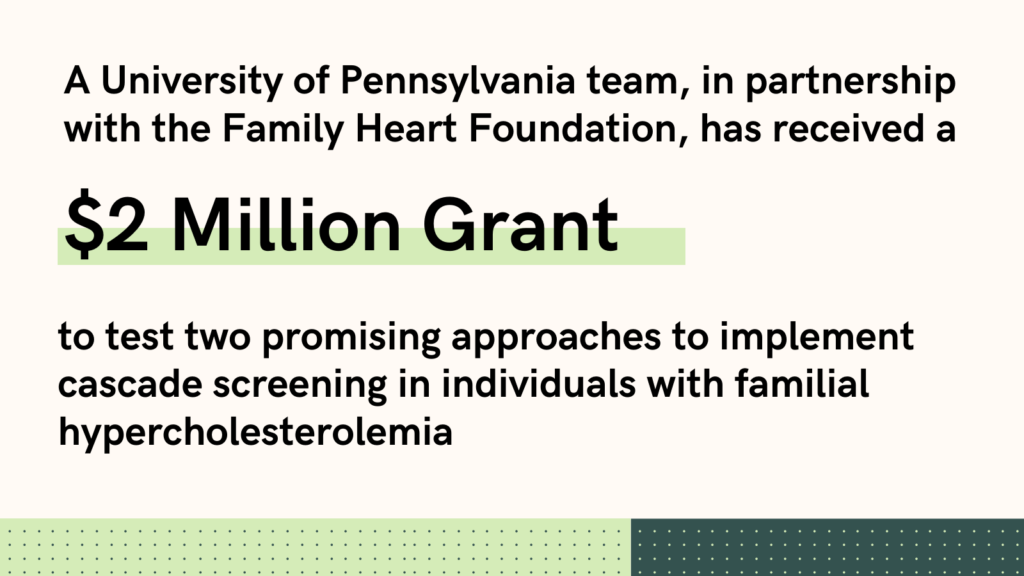Team Wins $2 Million Grant to Test New Approaches to Improve Familial Hypercholesterolemia Screening

A University of Pennsylvania team, in partnership with the Family Heart Foundation, has received a $2 million National Heart Lung and Blood Institute (NHLBI) grant to test two promising approaches to implement cascade screening in individuals with familial hypercholesterolemia (FH), a genetic disorder that affects 1 in 250 people. FH is one of only three genetic conditions that the Centers for Disease Control & Prevention has prioritized for cascade screening.
Cascade screening involves contacting and screening first-degree biological relatives of an individual diagnosed with FH. Family screening is rarely performed in a health care setting despite the fact that each first degree relative has a 50% chance of also carrying this life-threatening disorder, which can be addressed with early diagnosis and appropriate care. This screening helps quickly identify and diagnose individuals and reduces morbidity cost-effectively. According to the Family Heart Foundation, over 1 million Americans with this condition remain undiagnosed, and racial and gender disparities persist.
“Even when the signs are there, an FH diagnosis is often missed or comes too late after a cardiac event or even a death in the family,” said Katherine Wilemon, founder and CEO of the Family Heart Foundation. “Cascade screening is a challenge in our current health care system. The Family Heart Foundation is pleased to partner with Penn Medicine researchers to design and implement a national approach to successfully screen families leveraging the role that the Family Heart Foundation plays as a central hub for information and research.”
Rinad Beidas, PhD, Kevin Volpp, MD, PhD; and Daniel Rader, MD, FAHA, will serve as multiple principal investigators for this grant from the NHLBI. They offer expertise in implementation science, behavioral economics, and FH, respectively. The research team also includes Mary McGowan, MD, Chief Medical Officer, and Katherine Wilemon, CEO of the Family Heart Foundation, for this research collaboration. They bring their expertise in FH and cascade screening, as well as the organization’s experience in patient communication and care navigation.
The team will co-design, pilot, and test two implementation strategies (informed by behavioral economics principles) to increase the reach of cascade screening with 300 patients at Penn Medicine. In their randomized control trial, they will test:
- A health system-mediated strategy using automated text messages
- A Family Heart Foundation mediated strategy using its centralized patient navigation services
- The usual care approach
“By testing scalable implementation approaches informed by behavioral economics, our study results will be poised to guide future wide-scale implementation of cascade screening for FH and other genetic conditions within and outside large health systems while also answering important questions related to equitable implementation,” Dr. Beidas stated.
Drs. Beidas and Volpp are both part of the Center for Health Incentives & Behavioral Economics (CHIBE)’s leadership team. Dr. Beidas is CHIBE’s Associate Director, and Dr. Volpp serves as CHIBE’s Director. Dr. Beidas is also Director of the Penn Medicine Nudge Unit. Dr. Rader is Seymour Gray Professor of Molecular Medicine at the Perelman School of Medicine, Chair of the Department of Genetics as well as the Chief of the Division of Translational Medicine and Human Genetics in the Department of Medicine.